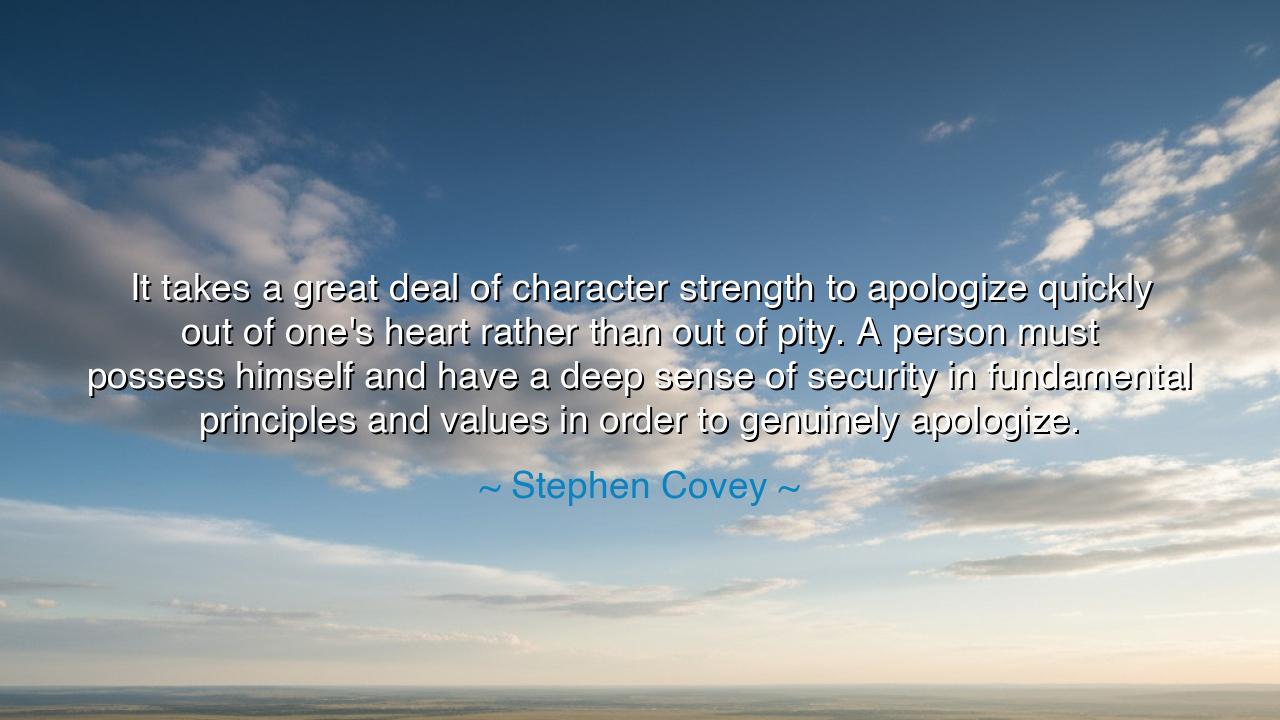
It takes a great deal of character strength to apologize quickly
It takes a great deal of character strength to apologize quickly out of one's heart rather than out of pity. A person must possess himself and have a deep sense of security in fundamental principles and values in order to genuinely apologize.






In this profound reflection, Stephen Covey — master teacher of character and principle — reveals the sacred courage hidden within humility. “It takes a great deal of character strength to apologize quickly out of one’s heart rather than out of pity.” These words remind us that the act of apology, when true, is not born from weakness or fear, but from inner security and moral strength. To apologize sincerely is to lay aside pride without losing dignity, to stand naked before another soul and say, “I was wrong.” Only a person grounded in truth, who knows who he is and what he stands for, can perform this quiet act of bravery without resentment or shame.
In the ancient spirit, Covey’s wisdom echoes the teachings of sages who saw self-mastery as the highest form of victory. The proud man, they said, conquers nations but not himself. The wise man, however, rules his passions, tempers his ego, and speaks peace even when wounded. To apologize from the heart requires this mastery — for it demands that one see beyond the fragile armor of self-importance, beyond the need to appear flawless. It is a battle between the false self, which fears humiliation, and the true self, which seeks harmony and truth. Thus, the apology becomes not an admission of defeat, but an act of inner sovereignty.
Covey warns that many apologies are born not of sincerity, but of pity or convenience. These are the false offerings — apologies that seek to ease guilt rather than restore trust. Such gestures lack the power to heal, for they spring from fear, not integrity. True apology requires a deep sense of security in one’s principles and values. The one who apologizes from such a place does not crumble; he stands firm. He does not say “I am nothing,” but rather “I am strong enough to admit my fault.” This is the paradox of humility: it is not the lowering of self, but the elevation of the soul.
Consider the story of Abraham Lincoln, who once faced fierce criticism from a subordinate after a costly decision in war. Rather than defend himself with anger, Lincoln listened in silence. Later, when the man realized his mistake and came to apologize, Lincoln stopped him and said, “There is nothing to forgive. We both acted in the light we had.” This was not the forgiveness of pride, nor an apology born of pity — it was the response of a man deeply rooted in principle. Lincoln’s greatness lay not in his authority, but in his humility balanced by conviction. He possessed himself — and therefore, he could extend grace to others.
The origin of Covey’s insight lies in his lifelong teaching of principle-centered living — a philosophy that values inner integrity over outward image. He believed that all true relationships, whether in family, leadership, or friendship, depend upon trust — and trust can only grow from authenticity. A quick apology that arises from the heart is the fruit of a disciplined character, one who has learned to put truth before ego, love before vindication. The man of principle does not wait to be proven wrong by others; he is guided by his own conscience, and when it convicts him, he moves swiftly to make peace.
The lesson is both timeless and practical: strength of character is not proven by stubbornness, but by the readiness to admit one’s mistakes. The proud delay their apologies until forced by circumstance; the wise offer them freely, knowing that humility preserves honor more than pride ever could. To apologize sincerely is to break the chain of ego that binds the world in conflict. It is to place healing above the need to be right.
So, my child, remember this teaching: when you have erred, apologize quickly, and let it come from your heart. Do not speak to escape discomfort, but to restore trust. Build your life upon principles so firm that no mistake can shake them. In every apology made in truth, a bit of the world is healed, and the soul grows freer. For in the end, it is not the unbroken who are great, but those who are brave enough to mend what they themselves have broken — and in doing so, prove that true humility is the highest form of strength.






AAdministratorAdministrator
Welcome, honored guests. Please leave a comment, we will respond soon